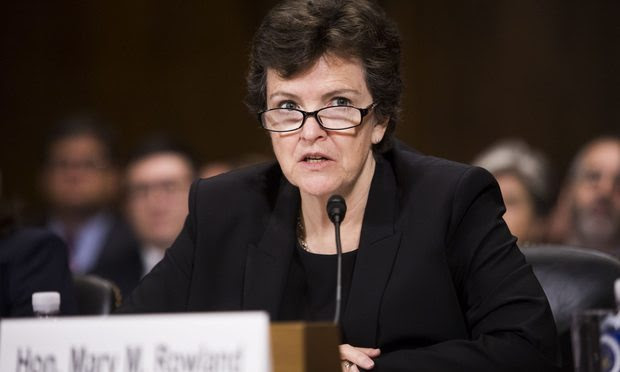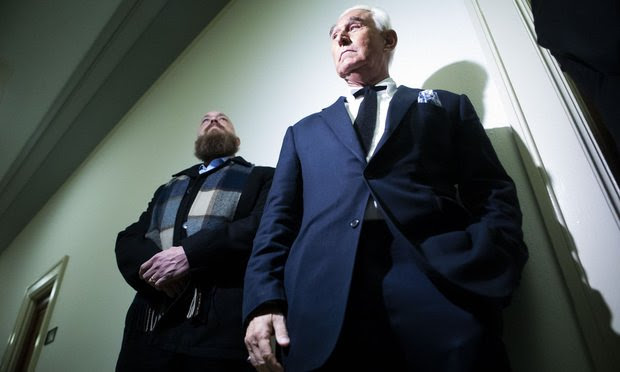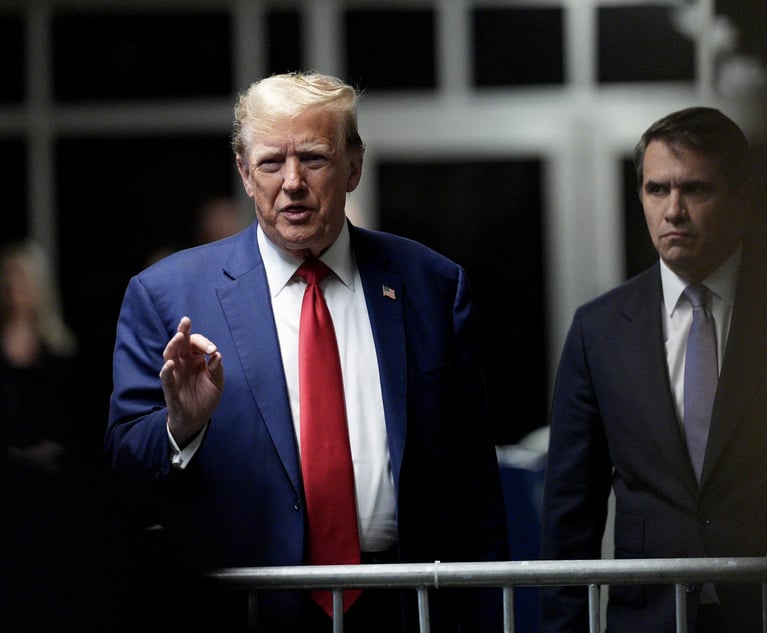Trump Watch: Who Didn't Make Trump's Renominations List + Why Democrats Are Miffed
While it appears the White House plans to resubmit or renegotiate some of these nominations, senators from Maryland, Illinois and Rhode Island said they were surprised Thursday by the exclusion of these picks.
January 25, 2019 at 04:54 PM
7 minute read
Welcome back to Trump Watch. The Trump administration renominated only 50 of over 70 lapsed judicial nominations this week, leaving a slate of noncontroversial picks in limbo and some Democratic senators frustrated. We break down what's happening in judicial nominations for you. What else happened this week? Keep up to date with the Trump Docket, below.
Thanks as always for reading. We appreciate your tips and comments. Feel free to reach out any time to [email protected] or follow me on Twitter @elliskkim.
 Judge Mary M. Rowland appearing at her confirmation hearing. Credit: Diego M. Radzinschi / ALM
Judge Mary M. Rowland appearing at her confirmation hearing. Credit: Diego M. Radzinschi / ALM
The Trump administration's decision to leave off nearly two dozen court picks in its list of judicial renominations has raised eyebrows in Washington, but it came with particular surprise for some of the nominees' home state senators.
Over 70 Article I and Article III judicial nominations lapsed at the end of 2018. The White House on Wednesday renominated 50 of those nominees, leaving behind approximately 23 judicial nominations. A large chunk of those nominees come from states with Democratic senators, like California, New York, Maryland, Illinois and Rhode Island.
While it appears the White House plans to resubmit or renegotiate some of these nominations, senators from Maryland, Illinois and Rhode Island said they were surprised Thursday by the exclusion of these picks, most of whom enjoy bipartisan Senate support. They also urged Trump to resubmit the nominees.
Among the missing nominees are three picks for the Northern District of Illinois, including Treasury Department lawyer Martha Pacold, Securities and Exchange Commission attorney Steven Seeger, and federal magistrate judge Mary Rowland, who would be Trump's first LGBT pick. All three were signed off as a batch nomination by the White House and Democratic Sens. Dick Durbin and Tammy Duckworth. Durbin, a member of the Senate Judiciary Committee, said the White House did not tell him in advance the picks would be left off.
“I don't know what to make of it. We had an agreement with them, and we can move forward with it. I just don't know what the situation is,” Durbin said, pledging to “find out” what happened.
The White House also left off the renomination of Stephanie Gallagher, a federal magistrate judge who was up for a Maryland district court seat. Sen. Ben Cardin, D-Maryland, said he raised the issue with the White House, noting he believed she would eventually be renominated but was “extremely disappointed” she wasn't on Wednesday.
“They've assured me she's going to be in a batch, but I don't know why it wasn't in the first batch,” Cardin said. “I've been talking to a lot of people about this, so we're going to raise a fuss.”
Also absent from the list is public defender Mary McElroy, a Rhode Island district court nominee. Democratic Sens. Jack Reed and Sheldon Whitehouse, in a joint statement, said McElroy is “highly-qualified, has overwhelming bipartisan support, and we remain steadfast in our commitment to seeing her get an up or down vote in the Senate.
“We expect she will be renominated and confirmed,” they said. Whitehouse, a member of the Judiciary Committee, on Thursday summarized the Trump administration's move withholding certain nominations in a more colorful way: “More hostages,” he said.
The White House, which did not return requests for comment, is not required to resubmit all of its nominees in one wave, and could renominate the remaining picks whenever it chooses. But, one former White House lawyer noted, it is easier to resubmit nominations all at once, and only putting off resubmissions if the nominees require more paperwork for the Senate.
The White House also notably did not include nominees from New York and California on this week's list. The White House informed at least some nominees earlier they would be left off for now, according to a person familiar with the situation.
Sens. Dianne Feinstein and Kamala Harris, D-California, are “in discussions” with the White House on those nominations, according to a spokeswoman for Feinstein. It is a signal that the White House might not necessarily return all of their nominations to the Senate. Harris acknowledged those talks with the White House, but declined to discuss the details Thursday since negotiations were ongoing.
The negotiations concern three lawyers previously nominated to the Ninth Circuit: federal prosecutor Patrick Bumatay, Munger, Tolles & Olson lawyer Daniel Collins, and Jenner & Block's Kenneth Lee.
The White House and California senators are also negotiating three nominees to the U.S. District Court for the Central District of California: Jeremy Rosen, Mark Scarsi and Stanley Blumenfeld, all of whom were left off Wednesday's list.
The White House also excluded seven district court nominees in New York, represented by Senate Minority Leader Chuck Schumer and Sen. Kirsten Gillibrand, a 2020 presidential candidate. The White House, however, did resubmit nominations for two Second Circuit and two other district court picks. Spokespeople for Schumer and Gillibrand did not return requests for comment.
The White House's list sloughed off a handful of other previously submitted nominees, including controversial picks like Tom Farr, whose bid was vehemently opposed by civil rights groups, and Ryan Bounds, whose nomination came under fire over a set of undergraduate writings.
John O'Connor, who was previously up for a seat in Oklahoma and received a “not qualified” rating from the ABA was left off this week's list. Two lawyers who withdrew their nominations—former Federal Trade Commission acting chair Maureen Ohlhausen, now at Baker Botts, and Anchorage-based lawyer Jon Katchen of Holland & Hart—were also absent from the announcement.
 Roger Stone, former Trump campaign advisor, right, inside the Rayburn House Office Building, ahead of a House Judiciary Hearing with testimony from Google CEO Sundar Pichai, on Tuesday, December 11, 2018. Credit: Diego M. Radzinschi / ALM
Roger Stone, former Trump campaign advisor, right, inside the Rayburn House Office Building, ahead of a House Judiciary Hearing with testimony from Google CEO Sundar Pichai, on Tuesday, December 11, 2018. Credit: Diego M. Radzinschi / ALM
Trump Docket
>> A stopgap spending bill. The president's announcement this afternoon that he'll sign a three-week spending bill—likely putting an end to a historic government shutdown—would mean good news for federal courts. The Administrative Office of the U.S. Courts had said Tuesday that the federal judiciary could only sustain paid operations through Jan. 31.
>> Another Mueller indictment: Roger Stone, the long time Trump ally and confidant, was indicted in special counsel Robert Mueller III's probe Friday. The indictment, returned by a Washington grand jury Thursday, contains seven counts: one count of obstruction of an official proceeding, five counts of false statements, and one count of witness tampering.
>> Census at SCOTUS: The Trump administration will ask the Supreme Court to overrule a federal judge's decision rejecting the addition of a citizenship question on the 2020 census, as Marcia Coyle reports. Solicitor General Noel Francisco's doling informing the high court came on Tuesday, as a third federal trial on the citizenship question kicked off in federal court in Greenbelt, Maryland.
>> More action, and inaction, at the high court. The Supreme Court, 5-4, lifted injunctions on the transgender military ban this week, while the policy is being reviewed in lower courts. The high court has not taken any action on Deferred Action for Childhood Arrivals, leaving the Obama-era program in place for now. Meanwhile, the U.S. Court of Appeals for the Second Circuit hears arguments on DACA today.
Speed Reads
>> “Ever since President Trump took office, his appointees have directed federal agencies to draft regulations meant to delay or reverse policies of the Obama administration. Nearly all the proposals have been tripped up by the same arcane 1946 law governing administrative policies.” [NYT]
>> “Fewer than half of the staff members in the Civil Division of the Department of Justice are considered 'essential,' erasing the division's presence from dozens of cases nationwide.” [Politico]
This content has been archived. It is available through our partners, LexisNexis® and Bloomberg Law.
To view this content, please continue to their sites.
Not a Lexis Subscriber?
Subscribe Now
Not a Bloomberg Law Subscriber?
Subscribe Now
NOT FOR REPRINT
© 2025 ALM Global, LLC, All Rights Reserved. Request academic re-use from www.copyright.com. All other uses, submit a request to [email protected]. For more information visit Asset & Logo Licensing.
You Might Like
View All
Legal Speak's 'Sidebar with Saul' Part II: GOP Pols Push Misinformation, Cohen Keeps It Together
1 minute read
Trump Barred From Appearing on Illinois Ballot as Overarching SCOTUS Decision Looms
4 minute read

The Judiciary's Electronic Court System Gets Poor Marks | Plus, A Look at Judicial Noms' Pay
6 minute readTrending Stories
- 1Supreme Court Takes Up Challenge to ACA Task Force
- 2'Tragedy of Unspeakable Proportions:' Could Edison, DWP, Face Lawsuits Over LA Wildfires?
- 3Meta Pulls Plug on DEI Programs
- 4On the Move and After Hours: Meyner and Landis; Cooper Levenson; Ogletree Deakins; Saiber
- 5State Budget Proposal Includes More Money for Courts—for Now
Who Got The Work
Michael G. Bongiorno, Andrew Scott Dulberg and Elizabeth E. Driscoll from Wilmer Cutler Pickering Hale and Dorr have stepped in to represent Symbotic Inc., an A.I.-enabled technology platform that focuses on increasing supply chain efficiency, and other defendants in a pending shareholder derivative lawsuit. The case, filed Oct. 2 in Massachusetts District Court by the Brown Law Firm on behalf of Stephen Austen, accuses certain officers and directors of misleading investors in regard to Symbotic's potential for margin growth by failing to disclose that the company was not equipped to timely deploy its systems or manage expenses through project delays. The case, assigned to U.S. District Judge Nathaniel M. Gorton, is 1:24-cv-12522, Austen v. Cohen et al.
Who Got The Work
Edmund Polubinski and Marie Killmond of Davis Polk & Wardwell have entered appearances for data platform software development company MongoDB and other defendants in a pending shareholder derivative lawsuit. The action, filed Oct. 7 in New York Southern District Court by the Brown Law Firm, accuses the company's directors and/or officers of falsely expressing confidence in the company’s restructuring of its sales incentive plan and downplaying the severity of decreases in its upfront commitments. The case is 1:24-cv-07594, Roy v. Ittycheria et al.
Who Got The Work
Amy O. Bruchs and Kurt F. Ellison of Michael Best & Friedrich have entered appearances for Epic Systems Corp. in a pending employment discrimination lawsuit. The suit was filed Sept. 7 in Wisconsin Western District Court by Levine Eisberner LLC and Siri & Glimstad on behalf of a project manager who claims that he was wrongfully terminated after applying for a religious exemption to the defendant's COVID-19 vaccine mandate. The case, assigned to U.S. Magistrate Judge Anita Marie Boor, is 3:24-cv-00630, Secker, Nathan v. Epic Systems Corporation.
Who Got The Work
David X. Sullivan, Thomas J. Finn and Gregory A. Hall from McCarter & English have entered appearances for Sunrun Installation Services in a pending civil rights lawsuit. The complaint was filed Sept. 4 in Connecticut District Court by attorney Robert M. Berke on behalf of former employee George Edward Steins, who was arrested and charged with employing an unregistered home improvement salesperson. The complaint alleges that had Sunrun informed the Connecticut Department of Consumer Protection that the plaintiff's employment had ended in 2017 and that he no longer held Sunrun's home improvement contractor license, he would not have been hit with charges, which were dismissed in May 2024. The case, assigned to U.S. District Judge Jeffrey A. Meyer, is 3:24-cv-01423, Steins v. Sunrun, Inc. et al.
Who Got The Work
Greenberg Traurig shareholder Joshua L. Raskin has entered an appearance for boohoo.com UK Ltd. in a pending patent infringement lawsuit. The suit, filed Sept. 3 in Texas Eastern District Court by Rozier Hardt McDonough on behalf of Alto Dynamics, asserts five patents related to an online shopping platform. The case, assigned to U.S. District Judge Rodney Gilstrap, is 2:24-cv-00719, Alto Dynamics, LLC v. boohoo.com UK Limited.
Featured Firms
Law Offices of Gary Martin Hays & Associates, P.C.
(470) 294-1674
Law Offices of Mark E. Salomone
(857) 444-6468
Smith & Hassler
(713) 739-1250








